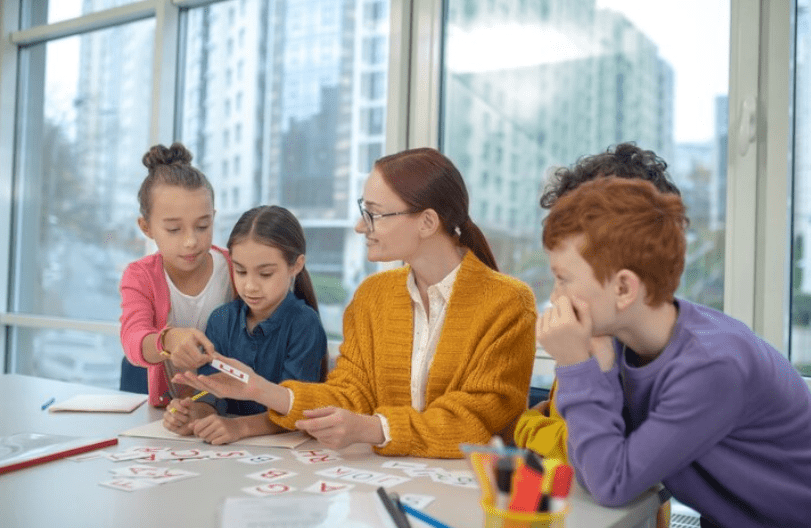In today’s rapidly evolving world, the ability to think creatively, work collaboratively in teams, and solve complex problems are invaluable skills.
As parents, educators, and mentors, it is our responsibility to foster these abilities in children from a young age.
By providing them with the right tools and environment, we can empower them to thrive in both their personal and professional lives.
In this article, we will explore effective methods to enhance creativity, teamwork, and problem-solving abilities in children.
1. Encourage Play-based Learning
Play is not just a pastime for children; it’s a powerful tool for learning and development. Encouraging children to engage in imaginative play helps stimulate their creativity and problem-solving skills.
Provide them with open-ended toys like building blocks, art supplies, and role-playing costumes that allow for endless possibilities.
Through play, children learn to experiment, take risks, and explore new ideas, laying the foundation for creative thinking and innovation.
2. Foster a Growth Mindset
A growth mindset is the belief that abilities and intelligence can be developed through dedication and hard work.
Encourage children to embrace challenges and view failures as opportunities for growth rather than setbacks. Praise their efforts and perseverance rather than focusing solely on outcomes.
By instilling a growth mindset, children learn to approach problems with resilience and optimism, essential qualities for effective problem-solving.
3. Provide Opportunities for Collaboration
Teamwork is an essential skill in today’s interconnected world. Provide children with opportunities to collaborate with their peers on various projects and activities.
Assign group tasks that require cooperation, communication, and division of tasks. Encourage them to listen to each other’s ideas, compromise, and work towards a common goal.
Collaborative experiences not only enhance teamwork skills but also foster empathy and respect for others’ perspectives.
4. Enroll Kids in STEM Summer Camps
Enrolling kids in STEM summer camps can be a highly effective method to enhance their creativity, teamwork, and problem-solving abilities.
STEM4kids summer camps provide a hands-on learning experience where children can engage in activities that challenge them to think critically, collaborate with others, and come up with innovative solutions to real-world problems.
By exposing kids to different STEM disciplines such as robotics, coding, and engineering, they can develop valuable skills that will benefit them in school and beyond.
5. Stimulate Curiosity and Exploration
Curiosity is the driving force behind creativity and discovery. Nurture children’s natural curiosity by exposing them to a wide range of experiences and opportunities for exploration.
Take them on nature walks, museum visits, and science experiments that ignite their sense of wonder and curiosity. Encourage them to ask questions, seek answers, and think critically about the world around them.
By fostering a sense of wonder and curiosity, you lay the groundwork for lifelong learning and creative thinking.
6. Encourage Divergent Thinking
Divergent thinking is the ability to generate multiple solutions to a problem by exploring various perspectives and possibilities.
Encourage children to think outside the box and explore unconventional ideas. Provide them with open-ended prompts and challenges that require creative thinking and brainstorming.
Teach them techniques like mind mapping, brainstorming, and role-playing to unlock their creativity and generate innovative solutions to problems.
7. Incorporate Arts and Creativity into Learning
The arts play a crucial role in nurturing creativity and self-expression. Incorporate arts-based activities like drawing, painting, music, and drama into the curriculum to stimulate children’s imagination and creativity.
Encourage them to express themselves through various artistic mediums and explore different forms of creative expression.
The arts not only enhance creativity but also teach children to communicate effectively, think critically, and express their emotions.
8. Cultivate Resilience and Perseverance
Resilience is the ability to bounce back from setbacks and adapt to change. Teach children to embrace failure as a natural part of the learning process and encourage them to persevere in the face of challenges.
Help them develop coping strategies and problem-solving skills to overcome obstacles and setbacks.
By cultivating resilience, you equip children with the confidence and determination to tackle difficult problems and pursue their goals with resilience and determination.
9. Promote Critical Thinking Skills
Critical thinking is the ability to analyze information objectively, evaluate evidence, and draw logical conclusions.
Encourage children to question assumptions, think critically, and examine issues from multiple perspectives. Teach them to distinguish between fact and opinion, identify bias, and assess the credibility of sources.
Provide them with opportunities to engage in debates, discussions, and inquiry-based learning activities that promote critical thinking skills.
10. Foster a Growth-Focused Learning Environment
Create a learning environment that fosters a love of learning, experimentation, and growth. Provide children with opportunities to pursue their interests and passions through self-directed projects and independent inquiry.
Celebrate their achievements and encourage them to set and pursue ambitious goals. By fostering a growth-focused learning environment, you empower children to take ownership of their learning journey and develop the skills they need to succeed in an ever-changing world.
11. Embrace Diversity and Inclusion
Exposure to diverse perspectives and experiences is crucial for fostering creativity and innovation. Create an inclusive environment where children feel valued and respected regardless of their background or abilities.
Encourage them to explore different cultures, traditions, and viewpoints through books, films, and community activities. Celebrate diversity and teach children to appreciate the richness it brings to their lives and the world around them.
Conclusion
Enhancing creativity, teamwork, and problem-solving abilities in children is essential for their future success and well-being.
By implementing effective methods outlined in this article, parents, educators, and mentors can empower children to unleash their full potential and thrive in a rapidly evolving world.
Through play-based learning, collaboration, diversity, curiosity, arts, resilience, critical thinking, and a growth-focused learning environment, we can cultivate the next generation of creative thinkers, team players, and problem solvers who will shape the future of our society.



